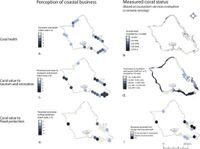As coral reefs continue to degrade under the pressures of climate change and human activity, their critical role in supporting coastal economies comes into sharper focus. A recent study conducted in Hawaii highlights a conundrum: coastal businesses, while benefiting from the ecosystem services provided by coral reefs, tend to underestimate their economic value. Nonetheless, these businesses exhibit a surprising willingness to invest in coral restoration initiatives, particularly those linked with local cultural heritage.
The research surveyed 202 coastal businesses across two Hawaiian islands—Oʻahu and Hawaiʻi Island—assessing their perceptions of coral health, economic value, and willingness to contribute to restoration efforts. Participants represented various sectors, including tourism and ocean recreation, which heavily depend on the health of coral ecosystems. According to the findings, although businesses largely rated the economic value of coral reefs as limited, many showed a strong readiness to financially support coral restoration efforts.
Coral reefs provide essential ecosystem services, such as storm protection and tourism revenue, estimated at over $1.8 billion annually for the U.S. alone. Despite this, many coastal businesses rated the health of nearby coral reefs as between “unhealthy” and “fair.” A surf-shop manager aptly captured this disconnect by stating, “You can surf on a dead reef,” highlighting how customer satisfaction does not seem to correlate with the ecological condition of coral reefs. Indeed, a whopping 84% of businesses surveyed claimed their customers were generally satisfied with their ocean experiences, regardless of coral health indicators.
The disconnect is further illustrated by the fact that many businesses reported coral health ratings based on subjective assessments rather than objective data. The study found a significant mismatch between perceived coral health and remotely sensed coral cover data. For instance, businesses in Waikīkī rated the reefs as “fair,” but remotely gathered data indicated that actual coral cover was significantly lower—between 0% and 5% in some areas.
Despite underestimating the ecological value of coral reefs, businesses showed a strong interest in participating in a proposed coral insurance program designed for local conservation efforts. Approximately 68.7% of responding businesses indicated a willingness to pay for coral restoration, with many opting for the maximum buy-in threshold of 0.5% of their annual revenue. This reflects a notable shift, suggesting that businesses may be motivated by reputational considerations and a desire for social approval from their communities, rather than purely economic reasoning.
Furthermore, a key motivator for participation in coral restoration was found to be intrinsic—business owners expressed a sense of responsibility to protect coral as a natural asset. Cultural ties were also significant, as Native Hawaiian businesses were 5 to 7 times more likely to participate in restoration efforts, reflecting a strong connection between indigenous identity and environmental stewardship.
The findings highlight the importance of engaging local businesses in restoration efforts and creating financial mechanisms that resonate with their motivations. While the private sector has often been seen as lacking in participation in conservation initiatives, this study offers compelling evidence that targeted awareness campaigns and education can foster a stronger sense of stewardship. Businesses can be incentivized to contribute meaningfully to the conservation of coral ecosystems they both rely on and affect.
Ultimately, the study emphasizes the need to align the economic benefits of coral reefs with an improved understanding of their value among local businesses. Strategies to bridge this gap include increasing awareness of the direct financial benefits of healthy coral ecosystems and enhancing educational initiatives that communicate the value of coral reefs effectively. Such measures could lead to far greater participation in restoration efforts and significantly enhance the health of coral ecosystems, securing both ecological and economic benefits for future generations.

